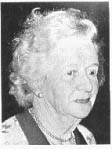Political campaigning
Women's organisations in Ireland had started to campaign politically for women's rights before the sensational and popular Women's Liberation Movement got under way in 1970.
A UN directive reached the Irish Housewives Association and the Business and Professional Women's Clubs in the late 1960s asking them to examine the status of women in Ireland and to urge the Irish government to set up a national commission on the status of women.
Several women's organisations met at the Central Hotel, Dublin in 1968 to discuss the status of Irish women. They eventually persuaded the Taoiseach, Jack Lynch, to establish the first national Commission on the Status of Women in March 1970.
Its terms of reference were:
To examine and report on the status of women in Irish society, to make recommendations on the steps necessary to ensure the participation of women on equal terms and conditions with men in the political, social, cultural and economic life of the country and to indicate the implications generally - including the estimated cost - of such recommendations.
Commission on the status of women report, 1972, p.7. |
Dr Thekla Beere, the first woman to become secretary of an Irish government department, chaired the commission of seven women and five men.
They asked for submissions, researched the status of women and issued their report to the government in 1972.

Thekla Beere
G.A. Duncan |
They found women were in fact subject to much inequality and made 49 recommendations and other suggestions summarised below:
- Equal pay. A policy of equal pay for women and men should be introduced and special pay scales for married men should be abolished.
- Women in employment. Women should be appointed to interview boards and have access to apprenticeships. Action was needed against sex-discrimination, marriage bars, and other forms of discrimination against women in the workplace. Women in employment should be entitled to paid maternity leave.
|
- Women and social welfare. Allowances should be provided or improved for married women, widows, deserted wives and unmarried mothers.
- Women and taxation. A married woman should receive the same income tax personal allowance as a single person.
- Women and the law. Both partners in a marriage should be under a joint obligation to support the family. Co-ownership of the family home should be encouraged as well as greater legal security for widows, divorced and deserted wives. Women should qualify for jury service on the same terms as men.
- Finance. Banks and other lending institutions discriminating in relation to loans on the basis of sex should be investigated.
- Women in politics and public life. Steps should be taken to ensure greater participation of women in politics and public life.
- Education. Co-education should be extended and girls encouraged to take up non-traditional subjects. The number of girls taking Mathematics and Science subjects should be increased. Girls should be directed more towards technical and skilled employment opportunities.
- Women at home. Marriage counselling services and expert advice on family planning should be made available throughout the country.
These recommendations were issued to the public in 1973. They were assigned to various government departments and several, but by no means all of them, were gradually implemented in subsequent years.
Questions
- In 1968, the Irish _________ ____________ met with other women's organisations and persuaded the Taoiseach, __________ ____________ to establish the first _____________ __ ___ _______ __ ________.
- Evaluate the terms of reference of the First Commission on the Status of Women as evidence that attitudes of politicians towards women had changed between the 1920s and 1970?
- Select any one of the points made by the First Commission on the Status of Women and develop it briefly.
- Discuss the view that most of the problems for women identified by the First Commission on the Status of Women were concerned with property.
- Did any of the above recommendations surprise you? Give reasons for your answer.
Activities
- Role play a meeting between a small delegation of women and the Taoiseach, Jack Lynch in the late 1960s or in 1970.
- Research the career of Dr Thekla Beere.
- Research the First Commission on the Status of Women.
- Write a speech in favour of, or in opposition to, any of the recommendations of the Commission on the status of women report, 1972.
